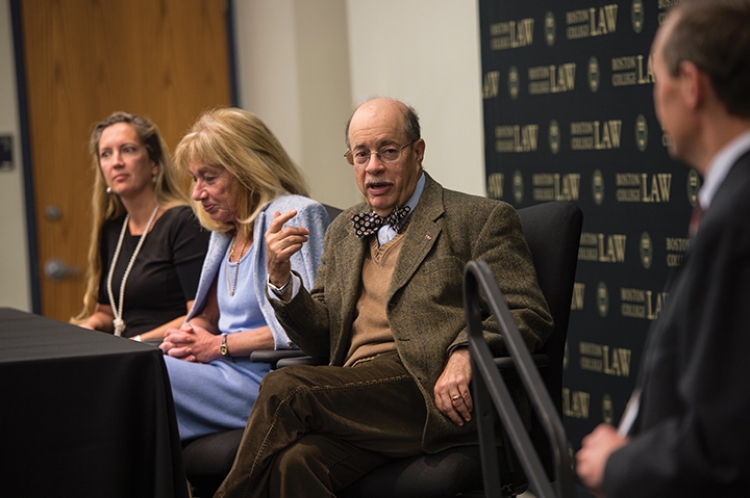
By
Boston College Law School paid host to a session of the Federal Circuit Court of Appeals last week, providing a rare chance for the Law School community to see one of the country’s more unique appellate courts in action.
The three-judge panel heard oral arguments for two hours on Oct. 6 in the school’s East Wing building. Four cases were presented, three of them related to patent infringement and one concerning a veteran’s claim.
The Federal Circuit is the only appeals court that has its jurisdiction based wholly upon subject matter rather than geographic location. The court hears certain appeals from all of the United States District Courts, appeals from certain administrative agencies, and appeals arising under certain statutes. Its jurisdiction includes the US Court of Appeals for Veterans Claims, the Trademark Trial and Appeal Board, the Patent Trial and Appeal Board and US International Trade Commission.
Although the court occupies the Howard Markey National Courts Building in Washington, DC, it occasionally sits in locations outside Washington. And when BC Law learned the Federal Circuit had decided to hold hearings in the Boston area, the school invited the court to have its session on Newton Campus.
“It is a considerable honor to get to host the Federal Circuit as it hears oral arguments on real cases,” says BC Law Associate Professor David Olson, who helped organize the event. “This is a rare opportunity, and we were very pleased to be able to make it happen. While the Federal Circuit has authority to have sittings in places outside its court building, it has not done so in a few years because of budget constraints from sequestration.
“Given that it’s a relatively small court, hears cases one week per month, and only meets outside its courthouse in DC occasionally, it is rare for a law school to get to host the court.”
The court will now return to Washington, where the judges will begin writing opinions on the four cases heard at BC Law; the opinions will likely be issues in the next few months, according to Olson.
After the court finished its sitting, the judges participated in a Q&A moderated by Olson, at which students were able to pose questions. In addition to discussing the process by which the court decides cases and assigns opinions to be written, the judges talked about how students might become judicial clerks.
The judges also gave some advice on the best ways to make appellate arguments in front of the court, says Olson: Do your homework, know the record forward and back, and don’t make rhetorical or emotional arguments to the panel.



